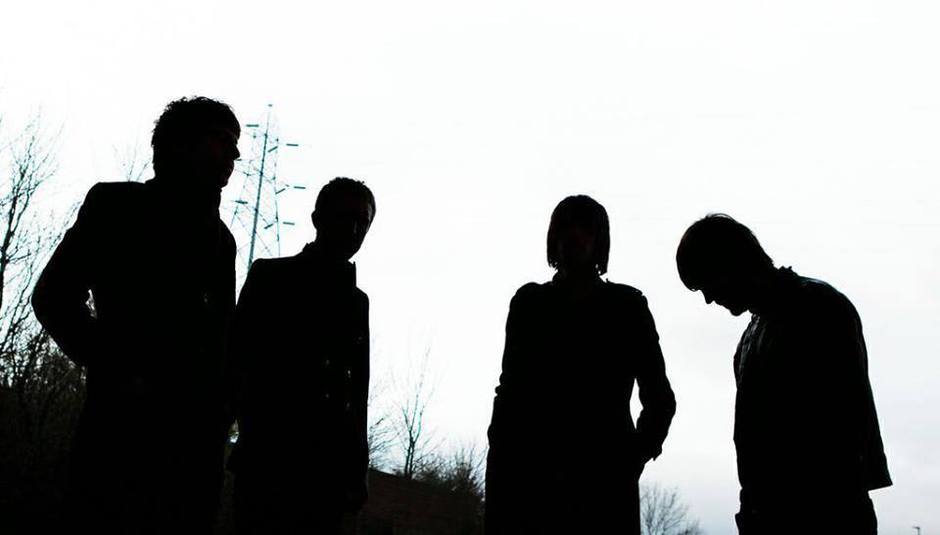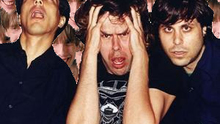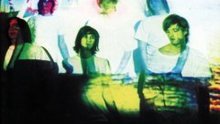Ever since their conception in 2006, Barnsley four-piece Exit Calm have been a regular name on Drowned In Sound's pages. Having established a reputation as one of the most incendiary live outfits on the UK circuit, they signed to esteemed London independent Club AC30 the following year, debut single 'Higher Learning' came out to a wave of accolades. The band's first self-titled long player followed suit in the early part of 2010, paving the way for its more accomplished successor The Future Isn't What It Used To Be in September of last year, which scored an impressive 8/10 here.
Following the record's release, the band have taken up what seems like a semi-permanent residence on the road. So it should come as no surprise that DiS caught up with vocalist Nicky Smith and drummer Scott Pemberton prior to their sold out show at Nottingham's Bodega Social.
DiS: This is last night of your current tour. How have the dates been so far?
Nicky Smith: It's only really been a mini-tour but apart from York it's been great. I think most bands seem to struggle when it comes to attracting an audience there.
DiS: Why do you think that is?
Scott Pemberton: I don't know. I guess it's not really renowned for being a musical city is it?
Nicky Smith: If you're taking a weekend break in York the last place you'd choose to go to would be a gig!
Scott Pemberton: The thing is though, it makes no difference whether there's 30 people there or 300. It's not the fault of those who are there that more people haven't turned out to see the band. They've bought their tickets so it's our duty to give them the show they've paid to see. We played gigs to some really small crowds when we first started out but a lot of those are people that enjoyed those shows and have stuck with us ever since.
Nicky Smith: It's the same with tonight. I'm actually fearing it because I know the last time we played in September was probably the best show we did on that tour, so expectations will be high this evening. From us as well as the audience in terms of how can we match that?
DiS: You seem to have been permanently on tour since the release of The Future Isn't What It Used To Be in September. How were the European dates at the back end of last year?
Nicky Smith: Amazing! It was brilliant. We did a lot of cities and I think we treated it as a bit of a holiday at first, but then by the time we got to Italy and Germany it dawned on us just what an honour it is to be in this band. There were people at the shows mouthing all the words to every song. When we played in Hamburg, someone actually brought along copies of every single thing Exit Calm have ever released, even things we hadn't seen before like radio promos! They had a carrier bag full of records and CDs for us to sign.
Scott Pemberton: It took us ages to go through the whole lot!
DiS: Do you think it's important for bands to tour as much as possible nowadays?
Nicky Smith: Definitely. We've always been a touring band. I've always preferred playing live. Records are just something that follow on from the shows for me.
Scott Pemberton: That's not to belittle the records, but I think an album is more of a snapshot of a time. Whereas when we go out on tour, every night is a bit different.
Nicky Smith: Also, we can't be lazy playing live. I'd never want anyone to watch one of our gigs back through You Tube. As good as I believe our gigs are, I've never seen any good footage captured that's been uploaded onto You Tube. Soundwise or anything. It's all about being there.
DiS: Do you feel more comfortable working as a live band? I remember visiting you in the studio when you were making the first album four years ago. There seemed to be a lot of tension in the air.
Scott Pemberton: I don't think we're necessarily unhappy in a studio. To me studios are just sterile environments. We've always had people questioning whether we can replicate our live shows on record, yet for us even when we're recording we try and approach it the same way as we would a live show. That's how we've always learned to do things. We didn't start off by recording in a studio. We started off by playing live.
DiS: Was making the first album something of a learning experience for the band? Did it play a part in how you approached making the follow-up?
Nicky Smith: It did. We tried to intensify it. The first album was more about us celebrating being in a band. It wasn't about trying to bring the world in.
DiS: For me, The Future Isn't What It Used To Be seems more structured as an album than its predecessor.
Scott Pemberton: A lot of first albums tend to be like that. I remember South's first record having fourteen tunes on it yet I absolutely love that album. But I think for them it was a case of getting to that stage where they had enough songs to record an album. Whereas with the second record you know exactly what you want to do before going back into it.
DiS: Lyrically as well as musically there seems to be a lot more depth to the songs on The Future..., particularly on the likes of 'Holy War' and 'Glass Houses'. Was it your intention to make the lyrics more prominent with this record?
Nicky Smith: The band make such powerful music that it wouldn't really work if I was just singing about any old shite over the top. So the lyrics have to be powerful as well. I would hope people appreciate that.
DiS: Is it a concern that your lyrics often get buried under a wall of sound?
Nicky Smith: No. I've been in the band for seven years now so not at all. Maybe the first week!
DiS: 'Holy War' mentions Mephistopheles from the sixteenth century Faust tales. Are you big fans of Faustian literature?
Nicky Smith: It was just an analogy. Lilith and Mephistopheles were said to be two demons cast out of heaven. The idea behind the song is about not being allowed into heaven. If I ever explained my direction of those lyrics I don't think it will ever change the listener's perception of what that song is about. I'd like to think the lyrics are ambiguous enough to have their own personal meaning to everybody. That's why I'd rather not talk about specifics.
Scott Pemberton: People are always going to have their own interpretations. If we were to make a list of our favourite bands and songs that crossed, I guarantee we'd all get different things from the same ones.
DiS: Were there many songs that didn't make the final cut for the album? Will any of those see the light of day in future?
Nicky Smith: We had a couple left over that went on b-sides. To be honest, we didn't actually sit down and write the album as such. It was more a case of how the songs gradually turned out.
Scott Pemberton: By the time we get to a studio, there is generally no fat. We don't believe in wasting time.
Nicky Smith: Anything we aren't sure about gets left behind in rehearsals.
Scott Pemberton: We like to have songs ready for when we get into the studio, rather than think about writing more songs while we're there. Why waste eight hours a day trying something that might never happen? That's not to say we won't rework a song or change something while we're in the studio. That's still being productive. But for us to just walk into a studio with the mindset of, "Let's press the tape and see what happens..." seems pretty pointless. That's just rehearsing. The best moments in a studio for me have involved capturing songs in one take. We've never been ones for doing countless takes on any of our records.
DiS: Bizarrely, in the band's earlier days you found yourselves placed at opposite ends of the musical spectrum, having signed to Club AC30 which is predominantly a shoegaze label, yet also supporting the likes of Ocean Colour Scene, The Twang and The Enemy. Do you feel that's worked in the band's favour or had a negative effect in terms of people's perceptions of the band?
Nicky Smith: I think it's worked against us. Our first manager seemed to want to push us as a lad band which we're not in any way. I wouldn't say we're hated by the alternative scene but it definitely created a few barriers that we're still trying to overcome.
DiS: Genre classification can be a hindrance in many ways as it often causes bands to be automatically pigeonholed.
Nicky Smith: I don't think we were aware of it at the time. We've always believed in this band so didn't really notice what kind of crowds we were playing to. In hindsight, I think we were pigeonholed in the wrong bracket.
DiS: One thing that I've often found bewildering is how you've largely been ignored by the UK music press, despite having earned a reputation as a great live band, not to mention a strong back catalogue of recorded output. Why do you think that is?
Scott Pemberton: I think it goes back to what we were talking about earlier. Some people just don't know where to place us.
Nicky Smith: A lot can depend on which press company you're with. The one we started out with used to mingle a lot with the NME staff and we did initially get a couple of reviews in their magazine, but then after we changed all that seemed to stop. I remember someone wrote to them asking why they didn't feature Exit Calm and the NME printed it with the reply reading something like, "Yeah lads, you've obviously wrote this letter yourselves."
DiS: Do you feel there is a lot of nepotism in the way bands get signed and publicised, particularly in London?
Nicky Smith: The printed press has been monopolised. Capitalism has totally ruined the music industry. It's becoming like the art world; a haven for middle class people.
DiS: Do you think it really matters that much which class background a band comes from?
Nicky Smith: I think having resources like money in place to buy equipment makes a big difference. For example Spacemen 3 - who I really love. Where did they get the money from to buy all that vintage gear when they first started out?
DiS: It's a fair point but then a lot of bands who spout on about being "working class" end up becoming a pastiche due to the lack of quality in their songs.
Nicky Smith: I probably shouldn't have used Spacemen 3 as an example because they're a great band, but I think there's a younger generation coming through now that don't believe music is actually worth anything. They don't see it as a valuable thing. They don't hold records in the same way I used to as a kid. Even though vinyl's slowly making a comeback, there's a generation that don't know what a record player looks like.
DiS: Why do you think that is?
Nicky Smith: The internet.
Scott Pemberton: Online is just convenience isn't it?
Nicky Smith: Laziness.
DiS: The most annoying statement I've heard in recent years is when people claim Simon Cowell and X Factor are killing live music. Reality television music shows have been around since I was a kid in the early 1970s, long before Cowell was ever involved in the music industry!
Nicky Smith: I totally agree with that. I remember talent shows like New Faces and Opportunity Knocks in the eighties.
Scott Pemberton: It's almost like saying if it wasn't for the National Lottery we'd all be millionaires! It hasn't killed music at all. It's quite easy to criticise Simon Cowell but at the end of the day, whatever he does has no impact on our lives.
DiS: Without meaning to sound demeaning, it's probably fair to say their audience would never go to an Exit Calm show. I think it more realistic to apportion a lot of the blame on major labels unwilling to invest on new artists that don't fit into a certain stereotype or mould. Albums seem to have been sidelined in favour of individual tracks suitable for radio playlists and television.
Scott Pemberton: A lot of it was caused during Britpop in the 1990s when money did get spent and a lot of fingers ended up being burned. Labels were employing three people to do one man's job. Next thing the accountants come in and question what do these people actually do, and before you know it labels were either going under or the ones that continued dropped their rosters. It's people like that who are responsible for the current state of the music industry not Simon Cowell. Love him or hate him, Simon Cowell makes money and creates things. I'd rather have him than someone who has a free mobile phone, a big fat salary, turns up to work in shorts all day then actually does fuck all. What's the point in that?
DiS: You worked with Paddy Byrne and Ulrich Schnauss on the first record, then Longview's Rob McVey on this one. Are there any other producers you'd particularly like to work with?
Nicky Smith: Definitely, but not through any fault of anyone that's worked with us. It's been one continuous learning curve. Obviously people have ambitions of working with Steve Albini or breaking Phil Spector out of prison but... The drum and bass sound we got working with Paddy Byrne on that first record was incredible, and we also spent a lot of time on the vocals too. With the second record, Rob (McVey) is his own entity so it was more a case of us bringing what we had to him, which worked. It felt like it was all four of us on that second album. Equal measures.
Scott Pemberton: And also we've not worked with a producer yet that's had any creative input. That may sound a little harsh because Paddy and Rob were both good mediators. On the first record, Paddy's man management was great. Because we knew what we wanted to do, he found then guided us down the best pathway to do it. Everything's worked so far and I genuinely believe we've made two great albums, but for the health of the band and also the people that listen to us the process needs to change a little bit.
DiS: In hindsight, is there anything you'd change with either record? Are you completely satisfied with the results on both?
Nicky Smith: I'd probably put 'Higher Learning' on the first record. The only reason it didn't go on is because we didn't want to re-record it. Although I still think that despite it being a great tune, it maybe wouldn't have fitted in with the other songs on that record. In a way it's also good that we've got a song like that in our back catalogue not many people know about.
DiS: It's funny you should say that as I was flicking through You Tube earlier today and came across a clip for early b-side 'Before Tomorrow', which Nicky had uploaded. At the start of the clip was a caption with a quote that simply said, "Your a-sides are not as good as our b-sides."
Nicky Smith: It probably makes us sound big headed when people see it but it's true!
DiS: There are a lot of bands that don't care about their b-sides. They just put throwaway remixes or demos on there that weren't good enough to stand up in their own right instead.
Scott Pemberton: It goes back to what we were saying earlier about not wasting time in the studio. Why would we do a throwaway tune? If we get sent a remix we listen to it as intently as we would a rehearsal when writing and shaping a new song. We'd never ask someone to remix one of our songs specifically for the intention of using it as a b-side. We might never get another chance to release a record, so why throw away something we're not happy with? I'm sure most bands who've done that will look back at their catalogue in twenty years time and think to themselves what a wasted opportunity.
Nicky Smith: I know it's not particularly cool to like Oasis but they always had great b-sides.
DiS: Are there any new songs in place for the third album?
Nicky Smith: We're writing at the moment.
Scott Pemberton: There’s five or six that we’re working on now.
Nicky Smith: But nothing ready as of yet. Ready is when they’re good enough for people to hear them.
Scott Pemberton: We’re going straight back into rehearsals on Monday when the tour’s finished. Writing and seeing what we come up with.
Nicky Smith: I like having something in our back pocket that nobody knows about.
DiS: Have you set yourself a timescale for any new material to be released?
Nicky Smith: I’d like to think it will be sometime this year. Maybe not an album but certainly an EP or something that bridges the last and next records. We’ve got a few ideas in mind. It’s just a case of getting it right.
DiS: You’re headlining the Club AC30 10th birthday party show at the Lexington in April. Do you have anything special planned for that?
Nicky Smith: We’re all going to dress up as Robin (Allport) and Duncan (Jones) from the label!
Scott Pemberton: It’s nice to be a part of it, nice to be asked. It’s good that our label want us to do something like that.
Nicky Smith: And Air Formation are playing too. They’ve reformed especially for it.
DiS: Going through Exit Calm's back catalogue, are there any songs you particularly look forward to playing? And vice versa too I guess, in terms of ones which you're not overly keen on any more?
Nicky Smith: You mentioned 'Glass Houses' earlier. We're not playing that at the moment.
Scott Pemberton: I guess your songs are like your children. You take a shine to one today and then it's another one's turn tomorrow.
DiS: What are your plans for the rest of the year?
Nicky Smith: To carry on writing. And hopefully return to Europe because they really welcomed us. We're planning to tour specific countries this time.
Scott Pemberton: Hopefully get a good festival run as well this summer.
Nicky Smith: We're doing a festival in Portugal in September which Robin from Club AC30's brother Nick has organised.
DiS: Finally, are there any new bands that you've been impressed with recently?
Nicky Smith: You probably know them already, but my current favourite Nottingham band are Cult Of Dom Keller.
Scott Pemberton: For me it would have to be Pusher. They're from Barnsley same as us. These past few months they've worked so hard and it's starting to pay off, so yeah, Pusher are my favourite new band.
Nicky Smith: Also Eastern Hollows from Brooklyn. Robin's just signed them to Club AC30.
For more information on Exit Calm visit their official website.























